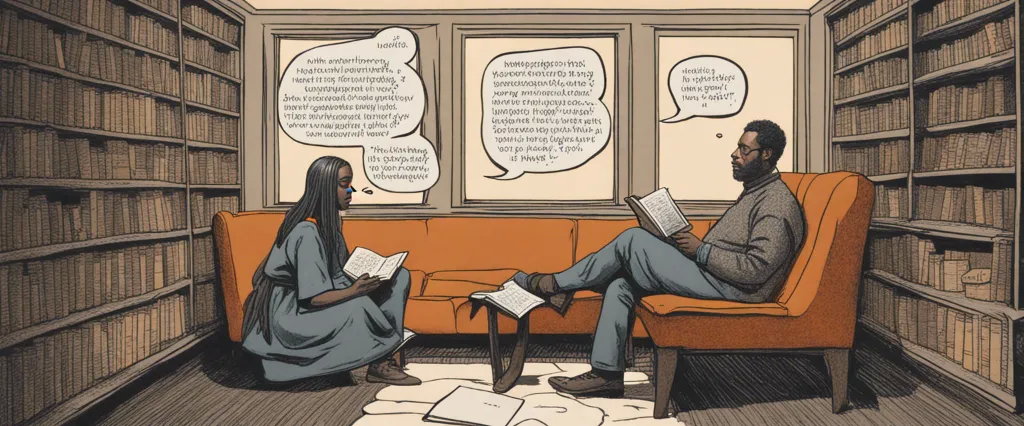
Chapter 1 What's Book Asking the Right Questions by M. Neil Browne
The book "Asking the Right Questions" by M. Neil Browne is a guide to critical thinking and effective communication. It provides readers with a framework for asking insightful and thought-provoking questions in order to enhance their ability to analyze information, evaluate arguments, and make informed decisions. The book explores various types of questions, common fallacies in reasoning, and strategies for approaching different situations with a critical mindset. "Asking the Right Questions" aims to empower readers to challenge assumptions, consider multiple perspectives, and engage in meaningful dialogue.
Chapter 2 Is Book Asking the Right Questions A Good Book
"Asking the Right Questions" by M. Neil Browne is generally well-regarded as a useful book for individuals looking to improve their critical thinking skills. It provides practical guidance on how to ask effective questions in order to analyze and evaluate information more effectively. Many readers have found it to be a valuable resource for developing critical thinking abilities, both as students and in various professional settings. However, opinions on the book may vary, so it would be best to read reviews or ask for specific recommendations to determine if it aligns with your interests and learning goals.
Chapter 3 Book Asking the Right Questions by M. Neil Browne Summary
"Asking the Right Questions: A Guide to Critical Thinking" by M. Neil Browne is a book that aims to enhance critical thinking skills by teaching readers how to ask effective questions. The book provides a comprehensive framework to approach decision making, problem-solving, and argument analysis.
The book begins by emphasizing the importance of asking the right questions in any situation in order to gather relevant information and make informed decisions. Browne emphasizes that critical thinking is not about finding the right answers, but rather about asking the right questions that lead to a deeper understanding of the issues at hand.
The subsequent chapters of the book provide specific techniques and strategies for formulating effective questions. Browne explores different types of questions, such as open-ended questions, closed-ended questions, probing questions, and leading questions. He also offers guidance on how to structure questions to encourage critical thinking, including asking questions about assumptions, evidence, implications, and alternatives.
Furthermore, Browne addresses common obstacles to effective questioning, such as biases, prejudice, and emotional barriers. He provides readers with tools to recognize and overcome these barriers, enabling them to think critically and objectively.
Throughout the book, Browne includes numerous real-life examples and case studies to illustrate the application of his questioning techniques in various contexts. He includes examples from fields such as business, media, politics, and everyday life, helping readers understand how to apply critical thinking skills to different situations.
In its conclusion, the book emphasizes the lifelong value of asking the right questions and continuously evaluating our thinking processes. Browne encourages readers to adopt critical thinking as a habit and to engage in ongoing reflection, questioning, and learning.
Overall, "Asking the Right Questions" by M. Neil Browne is a valuable resource for anyone seeking to improve their critical thinking skills. It provides practical tools, techniques, and examples to help readers think more critically and make better decisions in their personal and professional lives.

Chapter 4 Book Asking the Right Questions Author
- Neil Browne is indeed the author of the book "Asking the Right Questions: A Guide to Critical Thinking," which he co-wrote with Stuart M. Keeley. The first edition of the book was published in 1995. M. Neil Browne is recognized as an authority on critical thinking and critical inquiry. He has written extensively on the subject and is known for his expertise in teaching critical thinking skills.
Apart from "Asking the Right Questions," Browne has also co-authored several other books. Some of his notable works include:
- "Critical Thinking: A Concise Guide" (2007) - This book provides a concise introduction to critical thinking and guides readers through the steps of analyzing arguments effectively.
- "Thinking on Purpose: A 15-Day Plan to a Smarter Life" (2009) - In this book, Browne presents exercises and strategies to enhance one's critical thinking abilities and achieve personal growth.
- "Teaching Critical Thinking: Practical Wisdom" (2011) - Browne draws upon his extensive teaching experience to provide practical tips and techniques for educators to foster critical thinking skills in their students.
- "Thinking for Yourself: Developing Critical Thinking Skills Through Reading and Writing" (2017) - In this book, Browne focuses on developing critical thinking skills through engaging with written texts, both as readers and writers.
In terms of editions and popularity, "Asking the Right Questions" is widely regarded as Browne's most influential work. The book has been regularly updated and revised to reflect changes in critical thinking theory and application. The latest edition, as of 2021, is the 12th edition, which was released in 2020. It is considered the best edition in terms of incorporating contemporary examples, exercises, and updated content.
Chapter 5 Book Asking the Right Questions Meaning & Theme
Book Asking the Right Questions Meaning
The book "Asking the Right Questions" by M. Neil Browne provides guidance on critical thinking and effective decision-making by emphasizing the importance of asking the right questions. In this book, Browne explores different types of questions and how they can lead to better understanding, analysis, and problem-solving.
The main purpose is to teach readers how to think critically and cultivate their reasoning skills, enabling them to ask relevant, probing, and thought-provoking questions. By asking the right questions, individuals can gather more information, challenge assumptions, evaluate evidence, and draw well-reasoned conclusions.
Browne argues that asking the right questions is crucial not only in personal decision-making but also in various professional contexts like business, politics, education, and journalism. The book emphasizes that these skills are essential for everyone, regardless of their field or background, as they contribute to informed and effective decision-making.
Overall, "Asking the Right Questions" aims to empower individuals to become better critical thinkers by teaching them how to ask insightful questions to navigate complex issues and make informed decisions. It encourages readers to become more engaged and active participants in their own thinking process, empowering them to seek out answers that challenge assumptions and foster deeper understanding.
Book Asking the Right Questions Theme
The theme of the book "Asking the Right Questions" by M. Neil Browne is critical thinking and effective questioning. The book emphasizes the importance of questioning as a skill that is essential for making informed decisions and avoiding common pitfalls in decision-making. The author argues that by asking the right questions, individuals can challenge assumptions, uncover biases, and evaluate the credibility of information. The book provides practical strategies and frameworks for developing critical thinking skills and using questioning as a tool for problem-solving and decision-making.
Chapter 6 Other Accessible Resources
- Amazon: The book "Asking the Right Questions" by M. Neil Browne is available for purchase in both physical and Kindle editions on Amazon. Users can read customer reviews, browse related books, and access additional resources related to critical thinking and asking effective questions.
- Goodreads: Goodreads provides a platform for readers to access reviews, discussions, and recommendations about "Asking the Right Questions" by M. Neil Browne. Users can also join online book clubs or engage in Q&A sessions with other readers to delve deeper into the book's content.
- YouTube: There are numerous video resources on YouTube related to"Asking the Right Questions." These include book reviews, summaries, author interviews, and lectures on critical thinking and effective questioning techniques discussed in the book.
- Barnes & Noble: Barnes & Noble offers a platform for readers to purchase the book "Asking the Right Questions" in physical or Nook e-book format. Users can also find related books and access additional resources on critical thinking and problem-solving techniques.
- Google Books: "Asking the Right Questions" is available on Google Books, offering an online preview of the book's content. Users can read selected chapters, explore related books, and view annotations from other readers.
- Twitter: Twitter provides access to discussions, hashtags, and tweets related to "Asking the Right Questions." Users can follow relevant accounts, engage in conversations, and find recommendations from other readers or experts in the field.
- LinkedIn: LinkedIn offers various groups and communities focused on critical thinking and effective questioning techniques. Users can join relevant groups, access articles, engage in discussions, and connect with professionals who have implemented the principles discussed in the book.
- Quora: Quora is a popular platform where users can ask and answer questions on various topics, including critical thinking and problem-solving. By searching for related questions or topics, users can find discussions, insights, and explanations related to concepts explored in "Asking the Right Questions."
- Podcasts: Podcasts covering critical thinking and questioning skills often reference "Asking the Right Questions" or discuss related topics. Platforms like Apple Podcasts, Spotify, or Google Podcasts offer a wide range of shows where you can find relevant episodes to deepen your understanding of the book's principles.
- Academic Databases: Universities and academic institutions often have access to online databases where users can access scholarly articles, research papers, and studies related to critical thinking and questioning techniques. These databases include platforms like JSTOR, Google Scholar, and ProQuest, which can provide additional resources and references to enhance the knowledge gained from "Asking the Right Questions."

Chapter 7 Quotes of Book Asking the Right Questions
Book Asking the Right Questions quotes as follows:
- "The power of asking the right questions is indisputable. It is the key to unlocking knowledge and solving problems."
- "Asking the right questions requires open-mindedness and willingness to challenge assumptions."
- "Don't settle for surface-level answers. Dig deeper by asking probing questions that reveal hidden truths."
- "Question everything, especially your own beliefs and biases. This is how you grow and learn."
- "The quality of your questions directly reflects the quality of your thinking."
- "Avoid jumping to conclusions. Ask clarifying questions to ensure you have a complete understanding of the issue at hand."
- "Good questions lead to productive conversations, while bad questions can derail progress."
- "Be curious. Embrace uncertainty and explore different perspectives through thoughtful questioning."
- "Don't be afraid to ask difficult or uncomfortable questions. They often lead to the most valuable insights."
- "Remember, the answers you receive are only as good as the questions you ask."
Chapter 8 Similar Books Like Book Asking the Right Questions
Exploring the Intricacies of Relationships
Genre: Self-Help, Relationships
"The Five Love Languages" by Gary Chapman is an insightful guide that delves into the various ways individuals express and receive love. Similar to "Men are from Mars, Women are from Venus," Chapman's book emphasizes the differences in communication between partners. Through a practical framework, it helps readers understand their primary love language and learn how to effectively communicate their affection to their partner. This book is a must-read for anyone seeking to improve their relationships and create stronger emotional connections.
- "Attached: The New Science of Adult Attachment" by Amir Levine and Rachel Heller
Genre: Psychology, Relationships
In "Attached," Levine and Heller explore the fascinating concept of attachment styles in adult relationships. Drawing on extensive research and real-life examples, the authors discuss the three main attachment styles - secure, anxious, and avoidant - and how they influence our romantic connections. This book provides valuable insights into why we behave the way we do in relationships and offers practical advice on building healthier, more fulfilling bonds.
- "Crucial Conversations: Tools for Talking When Stakes Are High" by Kerry Patterson, Joseph Grenny, Ron McMillan, and Al Switzler
Genre: Communication, Conflict Resolution
Effective communication is a vital aspect of any relationship, but having difficult conversations can often feel overwhelming. In "Crucial Conversations," the authors present a practical framework to navigate conversations during challenging situations. This book offers invaluable tools to transform potentially destructive encounters into opportunities for growth and understanding. By mastering the art of crucial conversations, readers can foster open dialogue and build stronger connections with loved ones.
- "The Power of Now: A Guide to Spiritual Enlightenment" by Eckhart Tolle
Genre: Spirituality, Personal Development
"The Power of Now" by Eckhart Tolle is a transformative read that explores the concept of living in the present moment. While not directly focused on relationships, this book offers powerful insights into understanding oneself and developing a deeper awareness of the connection between mind, emotions, and actions. By embracing the present moment, readers can cultivate more fulfilling relationships, free from the burdens of past resentments or future anxieties.
- "Hold Me Tight: Seven Conversations for a Lifetime of Love" by Dr. Sue Johnson
Genre: Psychology, Relationships
Dr. Sue Johnson, a renowned therapist, presents a groundbreaking approach to couples' therapy in her book "Hold Me Tight." Based on Emotionally Focused Couples Therapy (EFT), this book provides readers with practical techniques and exercises to enhance their emotional bond. Through seven transformative conversations, readers can discover the keys to lasting love and learn how to navigate the inevitable ups and downs of any relationship. Dr. Johnson's compassionate insights make this book an essential resource for couples seeking to build a deep, secure connection.
Feel free to explore these five books to expand your understanding of relationships, improve communication, and cultivate fulfilling connections in your life. Happy reading!